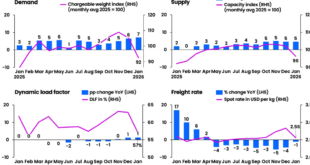International Distributions Services PLC (LON:IDS) saw revenue down 5.4% to £9.1bn over the first 9 months of the financial year. That reflected a 12.8% decline from Royal Mail that was partially offset by GLS, which rose by 9.7%.
Royal Mail continues to feel the impact of structurally lower demand for letters, with volumes down 25% on pre-pandemic numbers. Parcel volumes also fell, down 20% year-on-year as the group lapped the higher demand seen last year. Compared to pre-pandemic levels, parcel volumes fell 6%.
Q4 2022 hedge fund letters, conferences and more
Gates Capital Management Reduces Risk After Rare Down Year [Exclusive]
Gates Capital Management’s ECF Value Funds have a fantastic track record. The funds (full-name Excess Cash Flow Value Funds), which invest in an event-driven equity and credit strategy, have produced a 12.6% annualised return over the past 26 years. The funds added 7.7% overall in the second half of 2022, outperforming the 3.4% return for Read More
Over the 9 months, underlying operating losses from Royal Mail reached £295m. The net cost of the 18 days of strike action is being estimated at around £200m.
At the group level, despite more strikes than anticipated, a full year underlying operating loss is expected in the middle of the existing £350m-£450m range. That’s on the basis no further strike action occurs in the fourth quarter.
The shares rose 2.1% in early trading.
International Distributions Services Suffers Losses Due To Strikes
Matt Britzman, Equity Analyst at Hargreaves Lansdown
“It’s not usually the case that a projected operating loss of around £400m is met with a positive reaction from markets, but such is the state of Royal Mail’s parent company, IDS, this could have been a lot worse.
Strike actions have plagued Royal Mail over the last year, the 18 days of strikes was 6 more than IDS had originally built into its guidance. Credit should go to management, that actions taken to mitigate the impact of more recent strikes have limited the financial impact.
It’s certainly no time to celebrate though, strikes have still cost to the tune of £200m over the past 9 months, as battles with Unions over worker pay have lingered for much longer than anyone would have wanted. Current guidance is based on no further strikes and the Union accepting Royal Mail’s best and final offer – there’s no guarantee any of that happens.
Aside from the corporate drama, the underlying business is also suffering. Structural declines in letter volumes continue to impact performance and parcel demand’s falling back following a period of increased demand over lockdowns.
The shining light remains GLS, the international distribution business that sits under the IDS umbrella. Revenue growth, helped by price hikes, is helping to limit the impact of rising input costs and profits are expected in the region of €380- €400m for the full year.
It remains to be seen how long GLS and Royal Mail will remain under the same umbrella, management have hinted in recent updates that a split could be on the cards if Royal Mail can’t turn things around.
Source link



